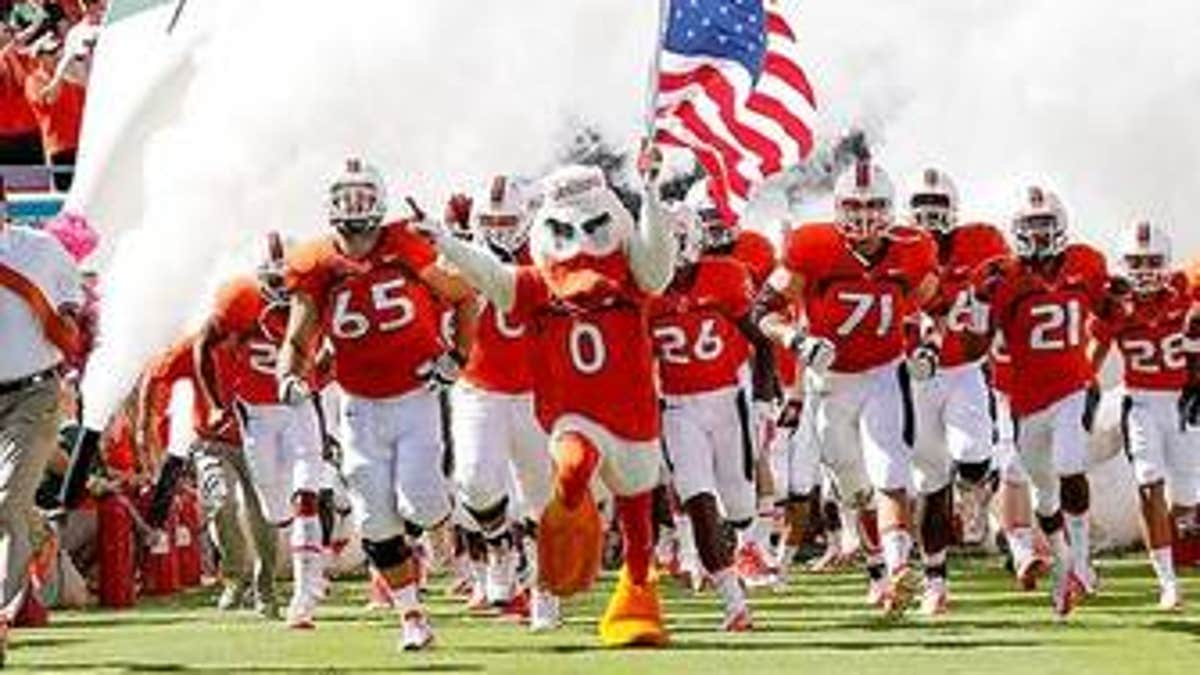
We waited 2½ years for this. For this? The NCAA finally finalized its case against the University of Miami on Tuesday, and the result is clear:
There is no governing body in college sports anymore. No police force.
That's it. For all that time, the NCAA twisted and turned over this case, thinking Miami represented every sin in college sports. According to sources, the wreck of this investigation tore down NCAA morale, turned its enforcement division into a shambles and created internal hard feelings toward NCAA chief Mark Emmert.
Basically, the NCAA stabbed itself in the heart over this case. And it all ended Tuesday morning with a 25-minute conference call and the NCAA telling Miami, basically, "Thanks for cooperating. You can go home now."
The NCAA delivered its sanctions Tuesday for the school's connection to notorious booster Nevin Shapiro, who allegedly handed over cash, gifts, trips ... you name it. He says he gave out more than a million dollars. For that, the NCAA took away three football scholarships per year for the next three years and counted as time served the Hurricanes' self-imposed two-year bowl ban.
Meanwhile, former Hurricanes basketball coach Frank Haith, who the NCAA apparently thinks lied during the investigation, was hit only for failure to monitor his program and not for unethical conduct. The Miami basketball program will lose three scholarships, and Haith, who's now Missouri's coach, will have to sit out five games.
Look, the story isn't even about Miami anymore. It's about who is keeping an eye on college sports. People have been cheering on the NCAA's demise for years. Now, they got what they want.
And where does that leave college sports?
At the top level, where revenues come into play, the NCAA is left only to run its wildly successful basketball tournament. The NCAA is less governing body than party planner.
So who is in charge? The big five football conferences are on the verge of splitting away from everyone else so they can keep the $7 billion in TV money for their new College Football Playoff. That's big business, serious commerce. And these conferences are now fully empowered to do whatever it is they want.
That is not a comfortable, trustworthy spot for such a big part of our education system.
This is not to question whether Miami did what it is accused of. It did. And then Miami punished itself and, the NCAA says, cooperated. (Not counting the basketball coach.)
That really isn't the point of the day. No matter how dirty Miami was, or is, or never was, the point is that the NCAA thought Miami was, roughly, the devil. And then it shook hands and went home.
Not long ago people thought of the NCAA as a dictator, doling out penalties that were too tough. Now, when it thinks it has the ultimate criminal, it hardly does anything.
The NCAA crushed USC over 2005 Heisman winner Reggie Bush's connections with and gifts from agents. Miami had more widespread connections.
USC didn't cooperate with the investigation, and Miami did. (Not counting the basketball coach.)
And USC not only got a two-year bowl ban but was decimated by massive scholarship reductions. Lane Kiffin came in to coach the football team and was blamed for losing with a team that had no depth, thanks to the sanctions. He was fired.
USC is still digging out. Miami is in perfect position to win the national championship this year.
"Each case is unique and, no doubt, folks will have a difference of opinion on whether penalties were too severe or too light," said Britton Banowksy, chairman of the NCAA infractions committee and also commissioner of Conference USA. "In this particular case, we felt like the institutional self-imposed penalties were significant, unprecedented.
"We don't do a great deal of comparative analysis. Each case stands on its own and has a different set of facts."
The facts are these: The NCAA still had power when it smacked USC. Now, it doesn't. That's why Oregon got off with nothing. Penn State got scholarships back. Johnny Manziel was suspended for one half of one game.
"The self-imposed penalties represented an indication by the university it was taking the case very serious,'' Banowsky said. "It understood it needed to respond internally. To impose those bowl bans, it's a big deal. A very big deal."
Maybe the treatment of Miami was right. Or maybe the treatment of USC was. But someone has to be in charge of policing right and wrong. Nobody likes the NCAA rulebook anymore, including Emmert.
But the NCAA doesn't make the rules, it only enforces them. Now, it doesn't even do that.
During the investigation, Emmert cited his own enforcement staff for unethical behavior in how it obtained information and threw out 20 percent of what it had gathered. Several staff members, feeling that Emmert should have backed them, have defected, leaving the NCAA for other jobs.
Jo Potuto, former chief of the NCAA infractions committee, told me that Emmert had made a big mistake, that the NCAA needs to toughen up and that it can't conduct investigations with a "white-glove approach."
She is calling for the NCAA to fight back.
Someone has to police college sports in the future. It can't be a party planner.
The original article can be found at FOXSports.com: More proof that NCAA is powerless.
